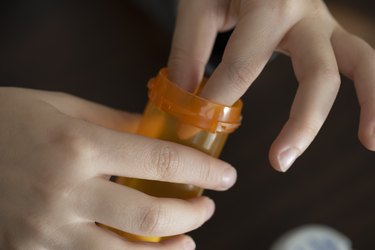
If you've been prescribed prednisone or a related steroid, these pills may cause some nutritional side effects. If you want to lessen the risk of adding pounds, retaining fluid or raising blood sugar or BP, here are some foods to avoid while on steroids — and a few things worth adding to your diet.
Read more: Does Taking Prednisone Affect Your Potassium Levels?
Video of the Day
Video of the Day
What Does Prednisone Do?
Prednisone is a corticosteroid, a group of drugs that act similar to hormones made by the adrenal glands, Mayo Clinic notes. Other corticosteroids include hydrocortisone, cortisone and methylprednisolone (Medrol). They are typically used to reduce inflammation and immune response in conditions such as asthma, arthritis and skin rash, among others. They may also be given if your body isn't producing enough of these hormones, the U.S. National Library of Medicine (NLM) says.
As Mayo Clinic points out, side effects depend on how high your dose is and how long you take the medication. A short-term and lower-dose course of prednisone may cause mild side effects, while taking higher doses or for longer periods may boost your risk of more troublesome side effects.
Among several possible prednisone side effects, Mayo Clinic cites these as ones you may be able to combat with diet changes:
- Weight gain.
- High blood sugar.
- High blood pressure.
- Fluid retention.
Fight the Munchies and Fats
Prednisone, particularly in higher doses, can send your appetite soaring and cause fat to accumulate, according to the University of California San Francisco (UCSF) Health.
To prevent weight gain, UCSF recommends people taking prednisone limit saturated fat and cholesterol by avoiding:
- Fried foods.
- Foods with extra oil, butter, margarine or mayonnaise.
And to avoid overeating, try eating several smaller, balanced meals that all contain some protein, says Stacy Kennedy, MPH, RD, CSO, a registered dietitian who is board-certified in oncology nutrition, and co-founder of Wellness Guides in Wellesley, Massachusetts.
"Getting a variety of fruit and vegetables, you get your potassium [and] get fiber," she says. The protein and fiber help satisfy hunger pangs, and the fruits and vegetables contain nutrients that help fight inflammation and boost the immune system.
Watch Carbs and Salty Foods
Kennedy says to stay away from carbs like:
- Cookies.
- Cakes.
- Sugary sweets.
- Juices.
- Sweetened beverages.
But not all carbs are bad. Roasted or baked potatoes — not drenched in butter or salt — are healthy side dishes, she says, and old-fashioned oatmeal — not the instant packets — makes for a good breakfast.
Spreading out food intake also helps avoid blood sugar spikes. "It can be really helpful for blood sugar," she says. "With steroids, that's really important."
UCSF recommends people taking prednisone cut out these additional simple carbs:
- Jams.
- Honey.
- Breads.
- Candy.
Prednisone causes your body to excrete less salt, so sodium levels rise, which can lead to fluid retention and high blood pressure, says National Jewish Health, which advises cutting back on:
- Salty condiments (soy sauce, Worcestershire sauce).
- Potato chips.
- Pretzels.
- Other packaged snacks and processed foods, which often contain substantial amounts of sodium.
Cut Down on Booze and Caffeine
Kennedy suggests limiting coffee and alcohol consumption, as too much can dehydrate the body. She also cautions against drinking soda, which often contains caffeine and extra sugar.
When plain water doesn't cut it, she advises adding a squeeze of lemon or lime juice.
Add These Foods to Your Diet
Prednisone and other steroids may disrupt your body's absorption and use of sodium, calcium, potassium, protein and vitamins C and D, according to National Jewish Health. It recommends including foods rich in potassium in your diet, such as:
- Orange juice.
- Bananas.
- Apricots.
- Cantaloupe.
- Tomatoes.
- Baked potatoes.
To counter calcium loss, Kennedy recommends including:
- Milk.
- Yogurt.
- Non-dairy milks fortified with calcium and vitamin D.
Dairy products provide the protein needed to keep muscles strong, improve wound healing and fight infection, according to National Jewish Health, which says calcium supplements are OK if needed.
And because prednisone may upset your stomach, take it with food or milk, and don't lie down for a few hours after a dose, according to the University of Pennsylvania's OncoLink.
- Mayo Clinic: “Prednisone and Other Corticosteroids”
- U.S. National Library of Medicine: “Prednisone”
- University of Pennsylvania OncoLink: “Prednisone (Sterapred, Prednisone Intensol)”
- University of California San Francisco Health: “ILD Nutrition Manual: Prednisone and Weight Gain”
- Stacy Kennedy, MPH, RD, PSO, registered dietitian, co-founder of the Wellness Guides in Wellesley, Massachusetts
- National Jewish Health: “Steroids and Nutrition”